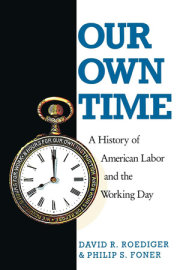“Roediger’s spellbinding account of black self-emancipation and the array of movements accelerated by this ‘general strike of the slaves,’ as Du Bois put it, reminds us that it is never too late to take up the democratic promise of Radical Reconstruction.”
—Angela Y. Davis, University of California, Santa Cruz
“Roediger shows how this massive self-emancipation from below set in motion ‘radiating impulses toward freedom,’ promoting literacy for freedmen, a pursuit of family ties and a new sense of social motion … Slenderly packed scholarship conveying provocative ideas.”
—Kirkus
“Seizing Freedom persuasively documents the self-emancipation of the enslaved Black folk of the American South. A meticulously researched book, unfailingly attentive to issues of race, gender, and labor. It brilliantly brings together disability studies, race in the Civil War, and the disappearance of the gold standard. A worthy supplement to Du Bois’s Black Reconstruction.”
—Gayatri Chakravorty Spivak, Columbia University
“This sparkling book does more than merely restore and underscore the agency of bold worker-slaves in attempts to make the United States democratic and free. It aims artfully at the underlying mechanisms of revolutionary transformation: imagination, solidarity, time, labor, the human body, gender, class, and race. In Roediger’s hands, these are neither dry nor overly abstract categories. The insurgent history of abolition gets resuscitated and used vividly to address a host of stalled contemporary debates and ossified styles of thought.”
—Paul Gilroy, King’s College London
“Sweeping in scope and filled with brilliant and original insights, this book reminds us of how little still is our appreciation both for what slaves accomplished between 1860 and 1865 and how beholden the national labor movement and the woman suffrage campaigns were to the ‘general strike’ they won. Evocative and inspiring, Seizing Freedom represents a landmark study by one of the foremost scholars of the history of race and labor.”
—Thavolia Glymph, Duke University
“Building on W.E.B. Du Bois’s depiction of the Civil War as a workers’ strike, Roediger traces the rise and fall of a social revolution—a jubilee—that in the course of a terrible war and its turbulent aftermath opened up the prospect of a more just nation, one in which all people could stand on a level and equitable ground. Asking readers to consider the slaves’ revolution alongside the struggles of the wartime wounded for a nation’s respect, women’s continued fight for full citizenship, and a working class who rallied to advance their own interests against a war-bloated industrial sector, Roediger repackages what are often told as separate narratives into a single story about how, under certain historical conditions, the impossible can come to pass. David Roediger reminds us that jubilee remains within reach.”
—Susan O’Donovan, Journal of American History
“Roediger suggests that we might learn from this period as we observe similar moments of convergence rise and fall … decidedly scholarly in its tone and careful positioning of its assertions.”
—Brendan Driscoll, Booklist
“[Roediger] concentrates on that revolutionary moment when the infectious jubilation of the freed slaves and their trust in the future inspired sympathizers in both North and South and sparked other freedom movements among workers, women, immigrants, and American Indians. It’s both a stirring and a cautionary tale, and one that I found has a surprising number of parallels in contemporary movements both in America and abroad.”
—Peter St. Clair, Brooklyn Rail
“Rather than a traditional narrative of reconstruction, Seizing Freedom compels readers to consider the eras of emancipation and Reconstruction as one in which a variety of social movements that existed simultaneously drew inspiration from a notion of liberation enacted and defined by the slaves themselves … Roediger [makes] the intricate and compelling case for the ways in which the realization of the impossible—the slave’s self-emancipation—fueled and connected the variety of social movements of the time, especially the laborers’ campaigns for an eight-hour working day and women’s rights activists’ campaigns for suffrage … it is exactly this optimism and ingenuity that makes Seizing Freedom such an exciting and instructive read, both in terms of rethinking the past and reimagining the present.”
—Elizabeth Regosin, St. Lawrence University, Register of the Kentucky Historical Society
“In insisting that the emancipation of the slaves has continuing relevance to the human quest for freedom, Roediger invites us to engage in the ongoing conversation between past(s) and present(s) that inform all emancipatory struggles.”
—Peter Rachleff, East Side Freedom Library, St. Paul, MN
“In resurrecting Du Bois’ insight, Roediger supplies a useful corrective to overly simplistic, top-down emancipation narratives. Where this book works best is in ‘telling a good set of stories usually kept apart’ and illustrating how freedom struggles can succeed, as well as how they fail.”
—Cleveland Plain Dealer












